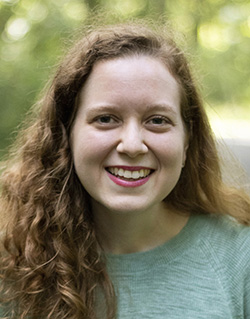Lindsey Weishar: ‘Why have I stayed Catholic?’ — a recollection, invitation

My Vocation is Love / By Lindsey Weishar
A friend recently shared that July 4th and New Year’s Eve are days of recollection for her. While those around her are focused on fireworks displays or welcoming in a new year, she takes a moment to pause, to take stock.
My own moment to do this came about a week after the 4th. I was sitting with fellow columnist Katie Faley and our mutual friend, Father Charles Klamut, at the One World café in Peoria. Father Charles posed a striking question: He said that instead of only asking why people leave the Church, we should also be asking practicing Catholics, “Why have you stayed?”
In taking stock of why I have stayed, I find giving expression to my various thoughts about as easy as trying to gather a bit of the ocean into a bouquet. Luckily, Scripture lends an anchor. I resonate with the words of Peter, which Father Charles recalled from John 6:68 during our conversation: “Master, to whom shall we go? You have the words of eternal life.”
If not Catholic, what else would I be? What other way of living life would be as full of meaning, as rich, as brilliantly mysterious?
ANOTHER LENS BY WHICH TO SEE
I am not a philosopher or a theologian, but I can tell you how Catholicism has spoken into my life as an artist. I have found the Catholic lens to be the broadest and most hopeful way to read and write about the world. Catholicism embraces all people, and searches for Christ in all faces, all stories. It calls me to clear the hurdles society puts up between myself and my neighbors. This way of seeing says, “Find the person.”
Why have you stayed Catholic? We extend the question posed by Lindsey Weishar and Father Charles Klamut to our readers. Email your responses to cathpost@cdop.org or mail to The Catholic Post, PO Box 1722, Peoria, IL 61656. We will consider them for publication in a future edition. Thank you!
It’s large enough that I’ll never grow into it and I rejoice in the fact that I can never know the entirety of it because I need something, Someone, bigger than me. I need mystery.
When I write, my Catholicism is present on the page, not because I write the words “God” or “Jesus” (I often don’t), but because to write is to dance, to remember that I am not alone in the writing, that He breathes.
I am also my most honest on the page. While I may verbally skip over hope while telling a friend about my life, I cannot do so when shaping a poem. I am a rather melancholic soul, and sometimes it’s quite easy to abandon trust, to seek the familiar makeshift shelter of my worries. Catholicism meets me there. Like the woman with the hemorrhages, I am invited to reach out and touch His tassel — again and again.
CATHOLICISM IS FOR EVERY PERSON
In recent years I’ve been struck by the parable of the workers in the vineyard (Matthew 20:1-16), how even those who joined for the last hour of the workday received the same wage. When thinking about these wages in terms of heavenly reward, it is rather beautiful that a person can find the faith at any time in life. This animates my desire both to never write off another person as permanently faithless, or to assume that a person’s faith life is effortless.
In one of her letters, Flannery O’Connor wrote, “Faith comes and goes. It rises and falls like the tides of an invisible ocean. If it is presumptuous to think that faith will stay with you forever, it is just as presumptuous to think that unbelief will.”
To be Catholic is to acknowledge the struggle of faith, that I am a sinner, and also that our Lord is bigger. It’s comforting to know that no matter how far I wander, I can’t escape Him, and that He’s marvelously creative in speaking to my heart.
TANGIBILITY
And lastly, for this article, anyway, I love that Catholicism invites us to engage not only with our spirit and our intellect, but also with our physical reality. In “The Reed of God,” Caryll Houselander says: “Christ always chose the purest and simplest material things as the means of giving His grace, which means giving Himself. Think of the things He used to make our life sacramental: water, oil, salt, wheat, wine, and words.”
The beauty of our faith is that it infuses extraordinary into the ordinary. We are humans who navigate the world through our senses. We are hungry, so Christ comes to us as food. This is also why incense, candles, rosary beads, stained glass, and images of saints are part of our experience of the faith. These tangible objects call us to “taste and see,” to delight in beauty, to contemplate the mysteries that surround us, to pray.
And so, dear reader, I pose the same question to you: Why have you stayed?
—
Lindsey Weishar is a poet, freelance writer, and member of St. Matthew Parish in Champaign. An assistant editor at The Young Catholic Woman, she has a master of fine arts in creative writing from the University of Missouri-Kansas City. Write to her at lweisharwriting@gmail.com .






